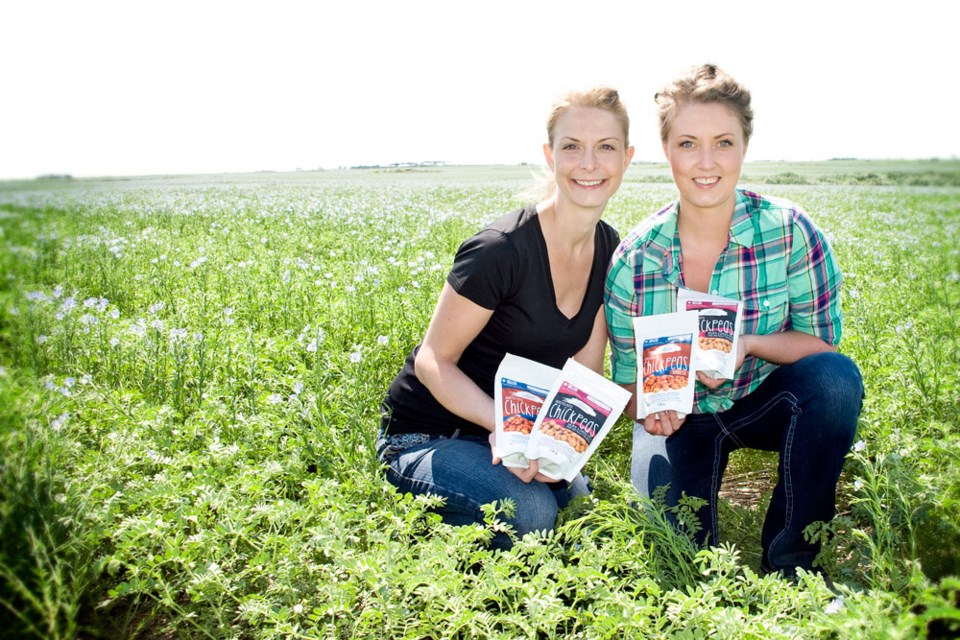The Three Farmers appear to have moved on from the Dragons’ Den.
Three Farmers is a Saskatchewan business with strong connections from southeast Saskatchewan. All five of the investors – Ron Emde, Colin Rosengren, and Dan Vandenhurk and his daughters Elysia and Natasha Vandenhurk – are from the Midale area originally.
Natasha Vandenhurk is the chief executive officer, while Elysia Vandenhurk is the chief operating officer and a red seal chef.
The sisters have twice appeared on the CBC television program Dragon’s Den, and shook hands on deals both times.
In 2012, their deal was with Arlene Dickinson for a stake in the company, back when the Three Farmers sold camelina oil. The deal was never finalized.
They returned for last year‚Äôs second chance show, and worked out a deal with three dragons ‚Äì Joe Mimran, Michael Wekerle and Manjit Minhas ¬Ý‚Äì on a royalty agreement in which the dragons would receive a percentage of the Three Farmers‚Äô sales.
The Vandenhurks’ emphasis in their second appearance was on chickpeas and pea pops.
The deal didn’t materialize during due diligence.
“On this occasion … it was really about expanding our roasting facility and repitching now that we’ve gone through some of those initial growing pains, and are a more established company,” said Vandenhurk.
Vandenhurk said when the Three Farmers started looking at the dragons’ expertise, and their experience of helping companies grow, they thought there might be better investments from other companies that had more experience in consumer packaged goods.
“We also did have a surge in interest from other private equity companies, so we started investigating other options and that’s the decision we made,” said Vandenhurk.
It was a very different arrangement from the one they had with Dickinson, and they went with the royalty arrangement instead of an equity offer from Canadian business leader Jim Treliving.
The royalty option made sense to them, because they didn’t have to sacrifice their ownership structure.
While they never actually closed a deal, Dragon’s Den proved to be a valuable experience. The Vandenhurks became very good at pitching their product, story and brand. They have also learned what private equity companies are looking for.
“You start looking at your company a little bit differently and you start planning where you want to be, and you start looking at your end goals a little bit differently, and so the steps that you take to get to those end goals are also altered based on what a private equity company might want to see going forward,” said Vandenhurk.
While Three Farmers has plenty of southeast connections, their head office is in Saskatoon, and they recently completed a $1.5 million production facility expansion in Moose Jaw that allowed them to move in some industrial-scale ovens, which were commissioned a couple of weeks ago.
The chick peas are sourced in and around Regina, and packaged in Regina, so it made sense to have their location near Regina. Their partner for the Moose Jaw facility, Prairie Berries, is ideal, Vandenhurk said.
It will allow the Three Farmers to saturate the Canadian market and move to the next level of growth, with U.S. entry and international sales on their roasted chick pea pops.
Those chick peas have now surpassed the camelina oil for their top-selling product.
“There’s a snacking evolution out there right now,” said Vandenhurk. “The price point is very reasonable.”
The U.S. expansion will be challenging. They need to have inventory specific to the U.S., and they’ll be dealing with the exchange rate.
“That said, the opportunity is that it’s a huge market,” said Vandenhurk. “It’s way bigger than Canada. In Canada, we’re finding that there’s just limitations in terms of there’s just so much competition. There are limited retailers and there are limited distribution opportunities, where in the U.S., there’s just a lot more opportunity to get your foot in the door with so many more chains.”
But Vandenhurk said the Three Farmers have done a few test orders to one of their larger customers that has a U.S. division. Those tests have gone very well. That partner will take the Three Farmers nationwide in the U.S.
Typically the company would focus in one regional area, and they will likely do that outside of their work with this partner.¬Ý
Vandenhurk hopes their products can be available in the U.S. in a couple of months.




